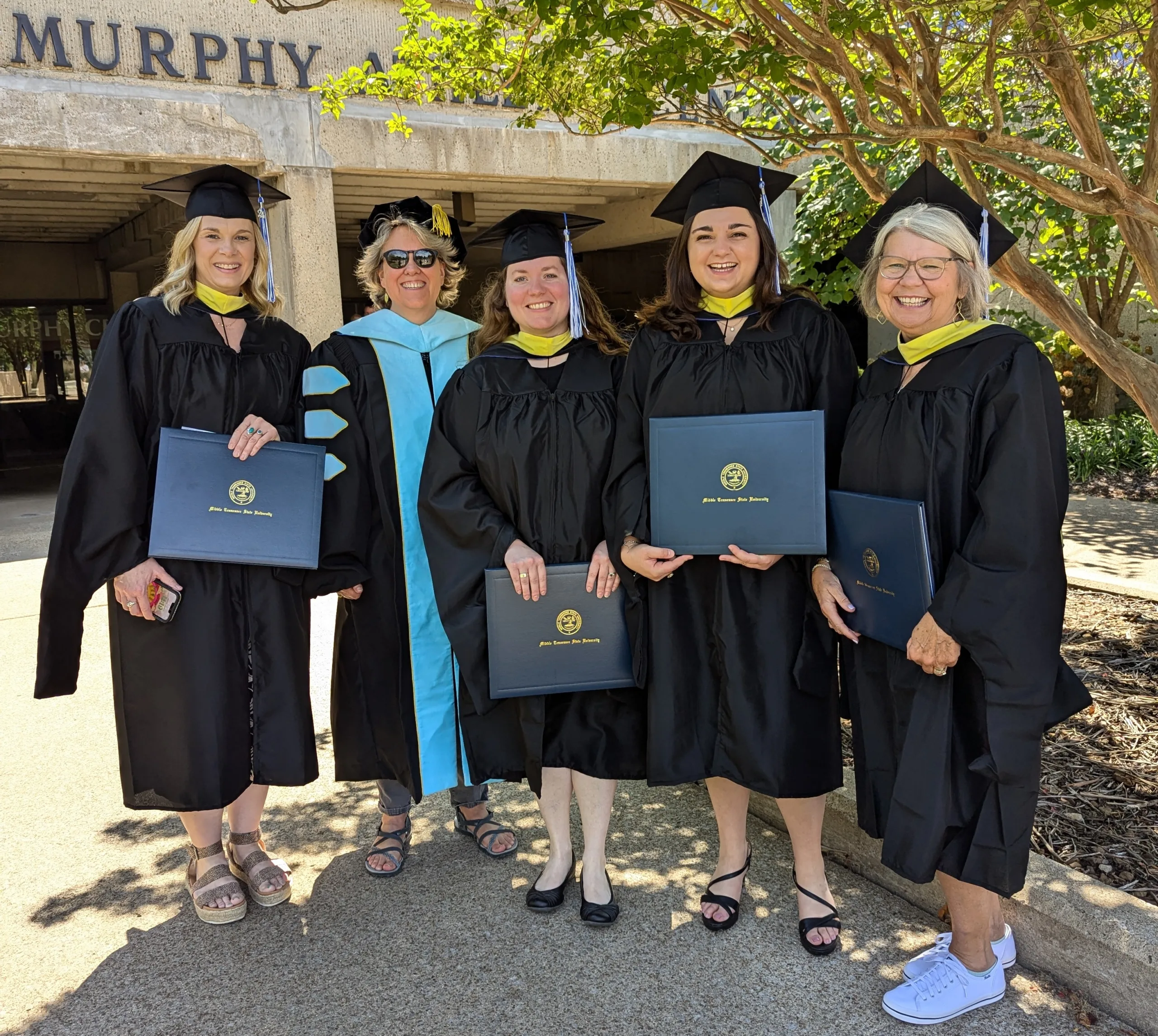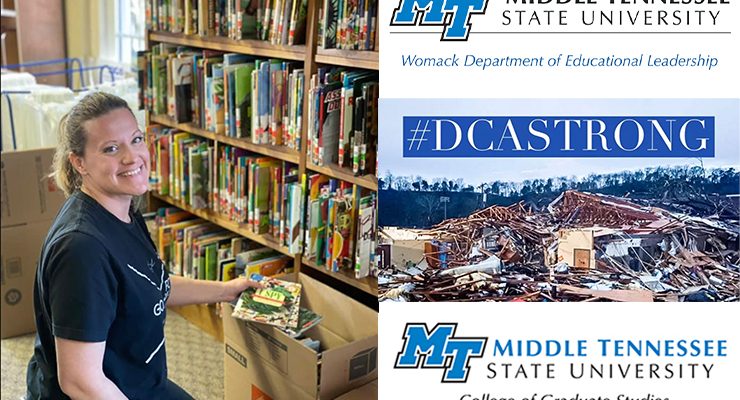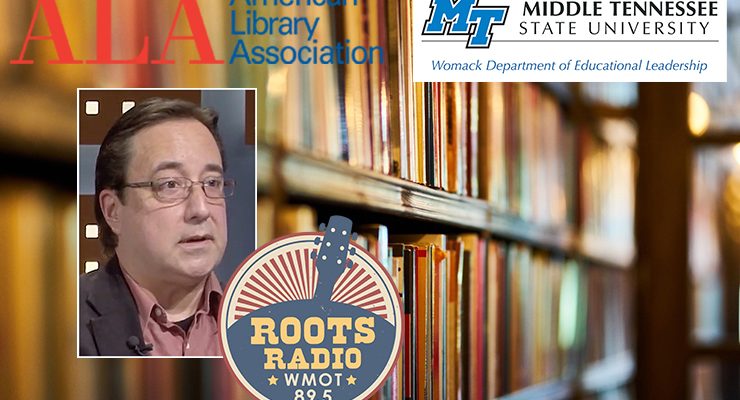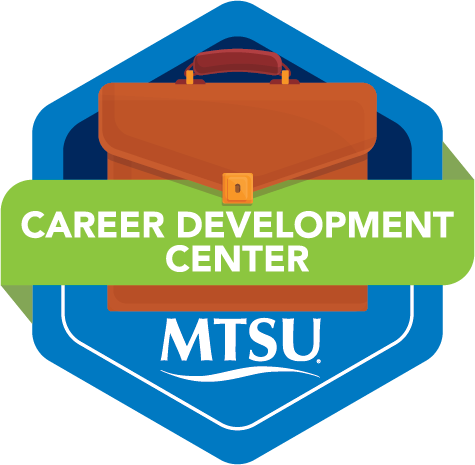
Library Science
Librarians are skilled professionals who address the information needs of communities. Become a difference maker today!
Library Science, M.L.S.
A flexible, forward-thinking online MLS program empowering the next generation of library professionals.
The role of librarians is continually evolving to meet the needs of our communities, from the smallest of rural counties to large urban areas. Here at MTSU, our Master of Library Science (MLS) Program is designed to prepare graduates to excel in today’s multicultural and global society. Our courses are taught by faculty with real-world experience and a user-based mindset, who focus on helping students build their library science knowledge while utilizing new and emerging technology, instruction, and management skills.
The MLS Program at MTSU has prepared library professionals since 2001 and is one of the most affordable programs in the state. Our program equips graduates to fulfill a variety of roles in public, academic, school, and special libraries.
Choose Between Four Focus Areas
The Master of Library Science degree program consists of 36 credits, with classes that are 100% online and asynchronous (except for the required in-person components of the field experience), allowing for greater flexibility with working students.
As a student, you can choose to focus on public, academic, school, or special librarianship, with an emphasis on the specific services and information needs of library users in those areas. Flexible coursework allows students to customize many assignments according to their interests and focus area. Students can propose alternative electives in other disciplines when appropriate. The field experience requirement helps produce the practice-ready librarians that employers are seeking. The required ePortfolio capstone project enables students to showcase their best work.
*No GMAT or GRE Required
View Our Latest Newsletter Here
Information Session
Register for our next Information Session on Thursday, May 1, 2025 at 7pm Central Time
Program Director
Holly Hebert, Program Director
(615) 898-5378
Holly.Hebert@mtsu.edu
Accreditation Statement
The Master of Library Science (MLS) Program at Middle Tennessee State University’s (MTSU’s) Womack Educational Leadership Department has been granted Precandidacy status by the Committee on Accreditation of the American Library Association (ALA). Precandidacy status is an indication that MTSU’s MLS Program has voluntarily committed to participate in the ALA accreditation process and is actively seeking accreditation. Precandidacy does not indicate that the program is accredited nor does it guarantee eventual accreditation of the program by ALA.
View MLS Program Data here.
News Briefs

MTSU alumna credits library science program with boosting skills, career
MTSU alumna Valerie Michel recalls the standout moments in her librarian and education career and describes how her time at MTSU shaped her approach to her job. A 2020 alumna of the College of Education’s Master of Library Science Program and January 2022 School Librarian of the Month per the Tennessee Association of School Librarians, [ Read More ]

‘Mastering Library Science’: Listen to March 23 ‘MTSU On the Record’
Producer/Host: Gina Logue Guest: Dr. Frank Lambert Synopsis: The assistant professor of educational leadership and director of the College of Education’s library science master’s degree program explains what it takes to get the endorsement of the American Library Association.[ Read More ]
News Briefs

MTSU alumna credits library science program with boosting skills, career
MTSU alumna Valerie Michel recalls the standout moments in her librarian and education career and describes how her time at MTSU shaped her approach to her job. A 2020 alumna of the College of Education’s Master of Library Science Program and January 2022 School Librarian of the Month per the Tennessee Association of School Librarians, [ Read More ]

‘Mastering Library Science’: Listen to March 23 ‘MTSU On the Record’
Producer/Host: Gina Logue Guest: Dr. Frank Lambert Synopsis: The assistant professor of educational leadership and director of the College of Education’s library science master’s degree program explains what it takes to get the endorsement of the American Library Association.[ Read More ]
Related Media

Library Science, M.L.S.
Careers in Library Science
Librarians are in demand at all kinds of libraries, including public, academic, school (in Pre-K-12 public & private schools), and special libraries (which include special collections in corporate, medical, military, and government libraries, archives, and museums).
Some Types of Librarian Positions:
Employers of MTSU Library Science alumni include:
Helpful Links to Librarian Job Sites:
- American Library Association JobLIST
https://joblist.ala.org/
- Tennessee Library Association Career Center
https://www.tnla.org/networking/opening_search.asp

MTSU’s Career Development Center
MTSU offers a comprehensive Career Development Center that serves students throughout the full student experience and beyond. They collaborate with faculty and staff to equip students with the tools to be marketable to the world of work and continuing education.
Students can schedule an appointment or check online resources and job boards at mtsu.edu/career.
Students can find current internship opportunities by talking to faculty and visiting the University job and internship board called Handshake.
Wondering what you can do with your major? Check out our What Can I Do with A Major In guides.



MLS Program Information
The Master of Library Science Program consists of 12 courses / 36 credit hours delivered 100% asynchronously online. Students set their own pace for completion. Most students take 2 courses at a time and finish in 2 years.
There are 8 core courses that every student takes:
- LIBS 6000 Librarianship
- LIBS 6011 Collection Development and User Services
- LIBS 6015 Introduction to Information Intermediation, Resources, and Instruction
- LIBS 6020 Organization of Information
- LIBS 6030 Information Technology for Information Professionals
- LIBS 6060 Understanding Research for Evaluation in Libraries
- LIBS 6100 Management of Libraries or LIBS 6105 School Library Management
- LIBS 6550 Supervised Field Experience in Library Science
Choose Between Four Focus Areas
Public Libraries
Students interested in working in public libraries will complete the 8 core courses (including a field experience in a public library), LIBS 6201 Public Libraries, and 3 electives of their choosing
Academic Libraries
Students interested in working in academic libraries (college, university) will complete the 8 core courses (including a field experience in an academic library), LIBS 6401 Academic Libraries, and 3 electives of their choosing.
Special Libraries
Students interested in working in special libraries will take the 8 core courses (including a field experience in a special library), LIBS 6700 Special Libraries and Librarianship, and 3 electives of their choosing.
School Libraries
Students interested in working in school libraries will take the 8 core courses (including a field experience in a school library), two required electives, LIBS 6310 Materials for Literacy of Children & LIBS 6311 Materials for Literacy of Young People and Adults, and two other electives of their choosing.
Students needing initial teacher licensure will also take LIBS 6345 and apply to the Teacher Education Program for Residency II.
Students seeking the Library Specialist PreK-12 Endorsement must also pass the PRAXIS 5312 School Librarian test with a passing score of 154.
Non-Degree Endorsement Only for school librarians (a master’s degree and initial teacher licensure required)
Specialist PreK-12 Endorsement for Tennessee only will complete 8 courses. Students must also pass the PRAXIS 5312 School Librarian test with a passing score of 154.
- LIBS 6000 Librarianship
- LIBS 6011 Collection Development and User Services
- LIBS 6015 Introduction to Information Intermediation, Resources, and Instruction
- LIBS 6020 Organization of Information
- LIBS 6105 School Library Management
- LIBS 6310 Materials for Literacy of Children
- LIBS 6311 Materials for Literacy of Young People and Adults
- LIBS 6550 Supervised Field Experience in Library Science
Additional information about licensure can be found on the Office of Teacher Licensure page.
Adjunct Faculty
In addition, Jo Williams, Cataloging Librarian, Walker Library, and Dr. John Lodl, are current online course designers for the MLS program.
Professional License Disclosure
Students in the Master of Library Science program may seek an initial teaching license and should consult with the program director and MTSU licensure office. The MTSU College of Education’s teacher licensure preparation programs are accredited by the Council for the Accreditation of Educator Preparation (CAEP). Students should be aware that licensure requirements vary from state to state and are subject to change. MTSU has not made a determination whether a specific program will meet all of the requirements of another US state or territory. MTSU recommends that students who plan to seek licensure outside the state of Tennessee contact the appropriate licensing agency and discuss their plans with their advisor. To obtain current information about each state’s and territory’s licensure requirements and any additional regulations, students should consult the US Department of Education’s website for state contacts at https://www.ed.gov/contact-us/state-contacts.
Graduates of MTSU teacher education programs certified to teach in Tennessee are eligible for certification reciprocity in many states. Reciprocity is not an automatic or complete transfer of certification, thus individuals should consult the Tennessee Department of Education (TDOE) site at https://www.tn.gov/education/educators/licensing.html and the National Association of State Directors of Teacher Education and Certification (NASDTEC) site at https://www.nasdtec.net/page/Interstate as well as the US Department of Education state contacts site for information about any additional state requirements.
MLS ePortfolio Requirement
All MLS and licensure students must complete an ePortfolio as the culminating capstone product for their degree or endorsement. The ePortfolio includes an artifact and reflection from each required key assessment as well as several choice artifacts that help the students showcase their best work. The ePortfolio is a requirement for graduation and must pass the final ePortfolio review.
Resources
MLS Materials
Financial Aid & Scholarships

CONTACT US














